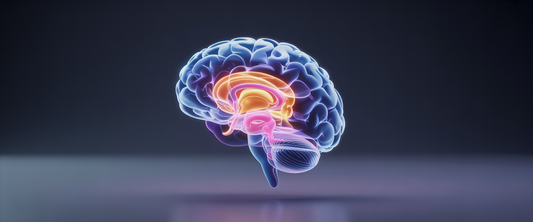Psychology professor reveals why fighting negative thoughts backfires

The rising tide of anxiety and negative thinking patterns has become a defining challenge of our time, with research showing that 43% of American adults reported feeling more anxious in 2024 compared to previous years. For health-conscious individuals, military professionals, and athletes who depend on peak mental performance, persistent negative thoughts can significantly impact cognitive function, decision-making, and overall wellness.
Traditional approaches to managing negative thoughts often focus on challenging or fighting these mental patterns, but emerging research in clinical psychology suggests this may not always be the most effective strategy. According to Georgetown University's Andrea Bonior, a teaching professor of psychology and licensed clinical psychologist, constantly battling negative thoughts can lead to mental exhaustion, particularly for those experiencing repetitive thought cycles.
The key lies in understanding evidence-based mental health optimization strategies that work with your brain's natural processes rather than against them. These scientifically-backed approaches can help support cognitive wellness while building resilience against the mental challenges that affect performance and quality of life.
6 Evidence-Based Strategies for Mental Health Optimization
1. Understand Your Brain's Negativity Bias
Research in neuroscience indicates that our brains are naturally wired to prioritize negative information as a survival mechanism. This evolutionary adaptation, known as negativity bias, helped our ancestors stay alert to potential threats but can become counterproductive in modern life when it manifests as persistent worry or rumination.
Implementation approach: Rather than viewing negative thoughts as personal failures, recognize them as normal brain function. Studies suggest that simply understanding this biological tendency can help reduce the emotional impact of negative thinking patterns. When negative thoughts arise, acknowledge them as your brain's attempt to keep you safe, then assess whether the perceived threat is realistic in your current situation.
Scientific rationale: Neuroimaging research shows that the amygdala, our brain's alarm system, responds more strongly to negative stimuli than positive ones. This understanding can help normalize the experience of negative thoughts and reduce the secondary stress that comes from judging yourself for having them.
2. Practice Acceptance Rather Than Resistance
Clinical psychology research suggests that acceptance and commitment therapy (ACT) may be more effective than traditional cognitive behavioral approaches for individuals experiencing persistent negative thought patterns. As Professor Bonior explains, "for people where it's constant negative thoughts, they're in a cycle of ruminations... What tends to happen for those folks who constantly challenge negative thoughts is that they become exhausted."
Implementation approach: Instead of immediately challenging every negative thought, practice observing them with curiosity rather than judgment. Notice the thought, acknowledge its presence, and allow it to exist without trying to change or eliminate it. This approach may help reduce the mental energy spent fighting thoughts and can support overall cognitive wellness.
Scientific rationale: Research indicates that psychological flexibility—the ability to stay present with difficult thoughts and feelings while continuing to engage in meaningful activities—is associated with better mental health outcomes. ACT techniques focus on developing this flexibility rather than eliminating unwanted thoughts.
3. Develop Mindful Observation Skills
Mindfulness-based approaches to mental health optimization involve gently observing thoughts without becoming entangled in their content. This practice can help create psychological distance between you and your thoughts, potentially reducing their emotional impact and supporting cognitive clarity.
Implementation approach: Set aside 5-10 minutes daily to practice mindful observation. When negative thoughts arise, imagine them as clouds passing through the sky of your mind. Notice their presence without trying to push them away or hold onto them. Some individuals find it helpful to label thoughts simply as "thinking" or "worrying" before returning attention to the present moment.
Scientific rationale: Neuroimaging studies suggest that mindfulness practices may help strengthen the prefrontal cortex while reducing amygdala reactivity. This brain pattern is associated with improved emotional regulation and may support better management of negative thought patterns over time.
4. Optimize Sleep for Mental Wellness
Sleep quality significantly impacts mental health and cognitive function, with research consistently showing connections between poor sleep and increased negative thinking patterns. Sleep disturbances can affect neurotransmitter balance and stress hormone regulation, potentially making the brain more susceptible to rumination and anxiety.
Implementation approach: Establish consistent sleep-wake times within a 30-minute window, create a cool, dark sleep environment, and develop a calming pre-sleep routine. Consider limiting screen exposure 1-2 hours before bedtime, as blue light can interfere with natural melatonin production. Some individuals find that magnesium glycinate (200-400mg) taken 30-60 minutes before bed may help support relaxation, though responses vary.
Scientific rationale: Studies indicate that adequate sleep supports healthy cortisol patterns and neurotransmitter function, both of which are associated with mood regulation and cognitive performance. Sleep deprivation can increase activity in brain regions associated with negative emotional processing while reducing prefrontal cortex function needed for emotional regulation.
5. Support Mental Health Through Nutrition
Emerging research in nutritional psychiatry suggests that dietary patterns may influence brain function and mood regulation. While nutrition alone cannot treat mental health conditions, certain dietary approaches may help support overall cognitive wellness and resilience against negative thinking patterns.
Implementation approach: Focus on whole foods rich in omega-3 fatty acids (fatty fish, walnuts, flaxseeds), complex carbohydrates for stable blood sugar, and foods containing tryptophan and tyrosine (precursors to mood-regulating neurotransmitters). Consider limiting processed foods, excessive caffeine, and alcohol, which may contribute to mood fluctuations. Some research suggests that probiotics may help support the gut-brain axis, though individual responses vary significantly.
Scientific rationale: Studies indicate that omega-3 fatty acids may help support healthy inflammation levels in the brain, while stable blood sugar helps maintain consistent neurotransmitter production. The gut-brain connection research suggests that gut health may influence mood and cognitive function, though more research is needed to establish specific recommendations.
6. Break Rumination Cycles with Behavioral Activation
Rumination—repetitive, passive thinking about problems without taking action—can trap individuals in cycles of negative thoughts that interfere with mental health optimization. Research suggests that behavioral activation techniques can help interrupt these patterns by redirecting attention toward meaningful activities.
Implementation approach: When you notice rumination beginning, engage in a predetermined activity that requires focused attention. This might include physical exercise, creative pursuits, social connection, or problem-solving tasks. The key is choosing activities that align with your values and provide a sense of accomplishment or meaning, rather than mere distraction.
Scientific rationale: Behavioral activation is based on research showing that engaging in meaningful activities can help improve mood and reduce negative thinking patterns. Studies suggest that purposeful action may help activate brain regions associated with positive emotions while reducing activity in areas linked to rumination and self-criticism.
Implementing Mental Health Optimization Strategies
The most effective approach to mental health optimization involves gradually incorporating these evidence-based strategies rather than attempting dramatic changes all at once. Start with one or two techniques that resonate most with your lifestyle and current challenges, allowing several weeks to establish new patterns before adding additional strategies.
Remember that individual responses to mental health interventions can vary significantly based on genetics, life circumstances, and overall health status. While these approaches have demonstrated benefits in research settings, they are meant to complement, not replace, professional mental health care. If you're experiencing persistent negative thoughts, anxiety, or other mental health concerns that interfere with daily functioning, it's important to consult with a qualified mental health professional who can provide personalized assessment and treatment recommendations.
Building mental resilience is an ongoing process that requires patience and consistency. By understanding your brain's natural tendencies and implementing evidence-based strategies, you can develop greater cognitive flexibility and support your overall wellness goals.



